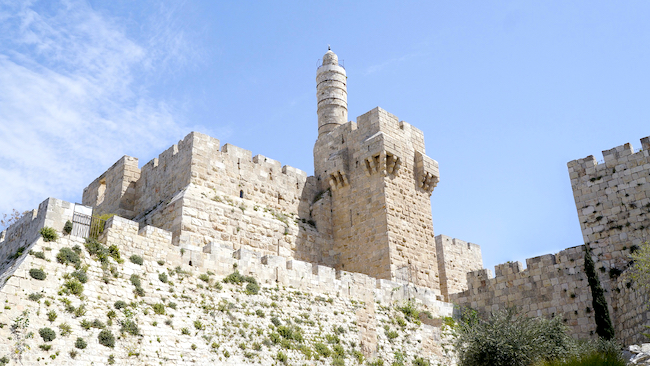
Yeshaya 66
This week’s haftorah, read in conjunction with Shabbos Rosh Chodesh, reveals to us a secret dimension of this significant date. In fact, as we will discover, Rosh Chodesh possesses the potential of assuming a greater personality than ever seen before. Its heightened effect will be so powerful that it will be likened to the impact of one of our three Yomim Tovim.
The prophet opens the haftorah with a fiery message regarding the privilege of sacrifice in the Bais Hamikdash. Yeshaya declares in the name of Hashem, “The heavens are My throne and the earth is My foot stool. What home can you build for Me and what is an appropriate site for My Divine Presence?” The Radak explains that Hashem was rejecting the notion of His requiring an earthly abode wherein to reside. Even the span of the universe barely serves as a throne where upon Hashem rests, how much more so our small Bais Hamikdash. But the purpose of His earthly abode is in order for us to experience His Divine presence. And it is in this uplifting environment that we offer sacrifices to Hashem and commit ourselves to fulfilling His will.
Yeshaya continues and expresses Hashem’s view of the Jewish people’s sacrifices at that time. Hashem says, “One who slaughters the ox is likened to smiting a man; he who sacrifices the sheep is akin to slashing a dog’s neck; a meal offering is like swine’s blood…..(66:3) The Radak explains Hashem’s disturbance and informs us of the attitude of those times. The people would heavily engage in sin and then appear in the Bais Hamikdash to offer their sacrificial atonement. However, this uplifting experience was short-lived and they would return home and revert to their sinful ways. Hashem responded and rejected their sacrifices because the main facet of the sacrifice was missing, the resolve to elevate oneself. From Hashem’s perspective, a sacrifice without an accompanying commitment was nothing more than an act of slashing a useful animal.
The prophet continues and notes the stark contrast between the above mentioned and the humble and low spirited people. Hashem says, “But to this I gaze, to the humble and low spirited and to the one who trembles over My word.” (66:2) These humble people do not need the experience of the Bais Hamikdash. They sense the Divine Presence wherever they are and respond with proper reverence and humility. Unlike the first group who limits Hashem’s presence to the walls of the Bais Hamikdash, the second views the earth as Hashem’s footstool and reacts accordingly. In fact weare told earlier by Yeshaya that they are actually an abode for His presence as is stated, “So says Hashem, “I rest in the exalted and sanctified spheres and amongst the downtrodden and low spirited ones.'”(57: 15)
In a certain sense we resemble the first group when relating to our Rosh Chodesh experience. Rosh Chodesh is a unique holiday because its entire festivity consists of a special Rosh Chodesh sacrifice. There are no specific acts of Mitzva related to Rosh Chodesh and there is no halachic restriction from productive activity. However, the first day of the month provides the opportunity for introspect. After our serious contemplation over the previous month’s achievements we welcome the opportunity of a fresh start. We offer a sacrifice in atonement for the past and prepare ourselves for the challenges of the new month. Unfortunately this new opportunity is met with trepidation and is always accompanied by mixed feelings of joy and remorse. Because each Rosh Chodesh we realize how far we have strayed during the previous month and we look towards the next month to be an improvement over the past.
This is the limited status of our present Rosh Chodesh. However, as we will soon learn, a greater dimension of Rosh Chodesh was intended to be and will eventually become a reality. The Tur in Orach Chaim (417) quotes the Pirkei D’R’Eliezer which reveals that Rosh Chodesh was actually intended to be a full scale Yom Tov. The Tur quotes his brother R’ Yehuda who explains that the three Yomim Tovim correspond to our three patriarchs and that the twelve days of Rosh Chodesh were intended to correspond to the twelve tribes. This link reveals that each Rosh Chodesh truly has a unique aspect to itself and that one of the Biblical tribes’ remarkable qualities is available to us each month. However, as the Tur explains, due to an unfortunate error of the Jewish people this opportunity has been, to a large degree, withheld from us.
But in the era of Mashiach this error will be rectified and the experience of Rosh Chodesh will actually reach its intended capacity. Yeshaya reflects upon this and says at the close of our haftorah, “And it will be that from month to month. . . . all will come and prostrate themselves before Hashem.” (66: 23) The Psikta Rabbsi (1:3) explains that in the days of Mashiach we will have the privilege of uniting with Hashem every Rosh Chodesh. All Jewish people will come to the Bais Hamikdash each month and experience His Divine Presence. During the illustrious era of Mashiach sin will no longer exist and Rosh Chodesh will be viewed exclusively as an opportunity for elevation. Each month will provide us its respective quality and opportunity which we will celebrate through the Rosh Chodesh festivities. The sacrifice of Rosh Chodesh will reflect our great joy over being with Hashem and will no longer contain any aspect of remorse or sin. In those days, the experience of His Divine Presence in the Bais Hamikdash will be perpetuated throughout the month and the entire period will become one uplifting experience.
This, according to the Maharit Algazi is the meaning of our Mussaf section wherein we state, “When they would offer sacrifices of favor and goats as sin offerings …. May you establish a new altar in Zion …. and we will offer goats with favor.” With these words we are acknowledging the fact that the goats which had previously served as sin offerings will now become expressions of elevation. Without the need to reflect upon our shortcomings of the previous month, Rosh Chodesh will be greeted with total happiness, and we will welcome with great joy the uplifting spiritual opportunity of each respective month.


